You may be wondering how easy or hard is self managing your buy-to-let property.
There has always been a lot of talk about the property rental business as an easy passive income stream.
In my opinion as a seasoned property professional, even if you don’t self manage, I’d look at it in practical terms and refrain from thinking of property investment as a 100% hands-off revenue earner.
However, having said that, I am excited to share how you can make self managing your property more efficient, less hassle, and overall a good return on your investment without the unnecessary headache.
Here are some practical ideas based on my own experience as a landlord, and helping other landlords over the years.
Keep a positive attitude
Firstly, a rental property can very often be a livewire requiring your constant attention.
Things are going to happen, such as electrical faults, doors off the hinges, or boilers breaking down.
You should be expecting calls anytime; it’s just the nature of the job. As a typical rule of thumb, you’ll find yourself carrying out more repairs to your rental property than you’d do to your own.
Keep hold of all relevant documents and insurance policies. Have a list of approved contractors and retain contingency numbers for good and reliable tradespeople in case of emergency.
I know, it sounds like a lot, but keeping a positive attitude, having good communication with your tenant and being prepared is key. Being a landlord you should have a system in place to deal with these issues quickly and without fuss.
As your experience grows as a landlord, you’ll get to know the most common issues and create a process for each.

Control the controllables
In my experience, a lot of problems can be avoided if the landlord had only been more proactive. By way of preparation, buy the best you can afford. Buying the cheapest washing machine, for example, is rarely a good idea.
It’s also important to regularly check any seals around baths, showers and sinks – a small amount of time spent here can help to avoid significant repairs in the future.
The same goes for boilers (look for a 10 or 12-year guarantee!), furniture etc. as if you don’t, it’ll come back to bite you in future.
You can consider having a good home cover with a 24/7 on call service. Scottish Power has an on-call service that might be worth looking into, whereas other heating engineers can offer cover plans that ensure your repairs get done fast.
In the previous article, Chris discussed how to keep your tenants happy. Lot of pointers there to keep small things erupting into big issues.

Strive for efficiency
Unfortunately, I see a lot of badly done rental properties ending up as a nightmare for the landlord. In our previous cost of living crisis blog, I talked about making your properties energy efficient.
There are various things you can do to ensure your property is more efficient, from fitting a new, A-rated boiler, to installing better insulation, solar panels or a ground-source heat pump.
This will also help to improve the overall value of your property, whilst reducing your carbon footprint.
Contingency planning
Consider keeping a contingency cupboard (something we’ve mentioned before in previous blogs) where you can keep things like extra fittings, a tool box, an emergency heater and other bits and pieces that you can quickly replace in emergency situations.
Choosing the right insurance, combined with due diligence is really crucial. This is the most under-utilised bit of planning a landlord can do, in my opinion.
In urgent or emergency situations, your contractors/tradespeople will be your best friends. Like I mentioned above, have several decent tried-and-tested approved contractors on the books for your own peace of mind’s sake.
Advice from the property pros

I have to constantly remind myself to look at the property as an investment; with less emotion and more objectivity. This helps, as the tenants don’t often look at your property from the same perspective as you.
At the end of the day, it’s simply a property that you as a landlord have provided for your tenants. Yes, you are the owner, but bear in mind it’s their home. Your job is to keep the property in top shape to ensure they’re safe, happy and comfortable.
In summary…
There we have it. It’s not exactly rocket science to run a property, but it can take a lot of energy, perseverance and the right attitude – which is why many landlords prefer a more hands-off approach.
If you do fancy self managing your buy-to-let property, stay positive, maintain a reliable, repeatable system, have a hold on the contingency planning, and always strive
for efficiency.
I wish you all the best with self managing your buy-to-let, but if you are looking for advice on buying tenanted property – or anything else for that matter – just give us a call.
We’re always happy to help – or point you in the direction of someone who can!
Written by Ross MacDonald, Director of Sales & Cofounder of Portolio
Get in touch on 07388 361 564 or email to [email protected]



Comments